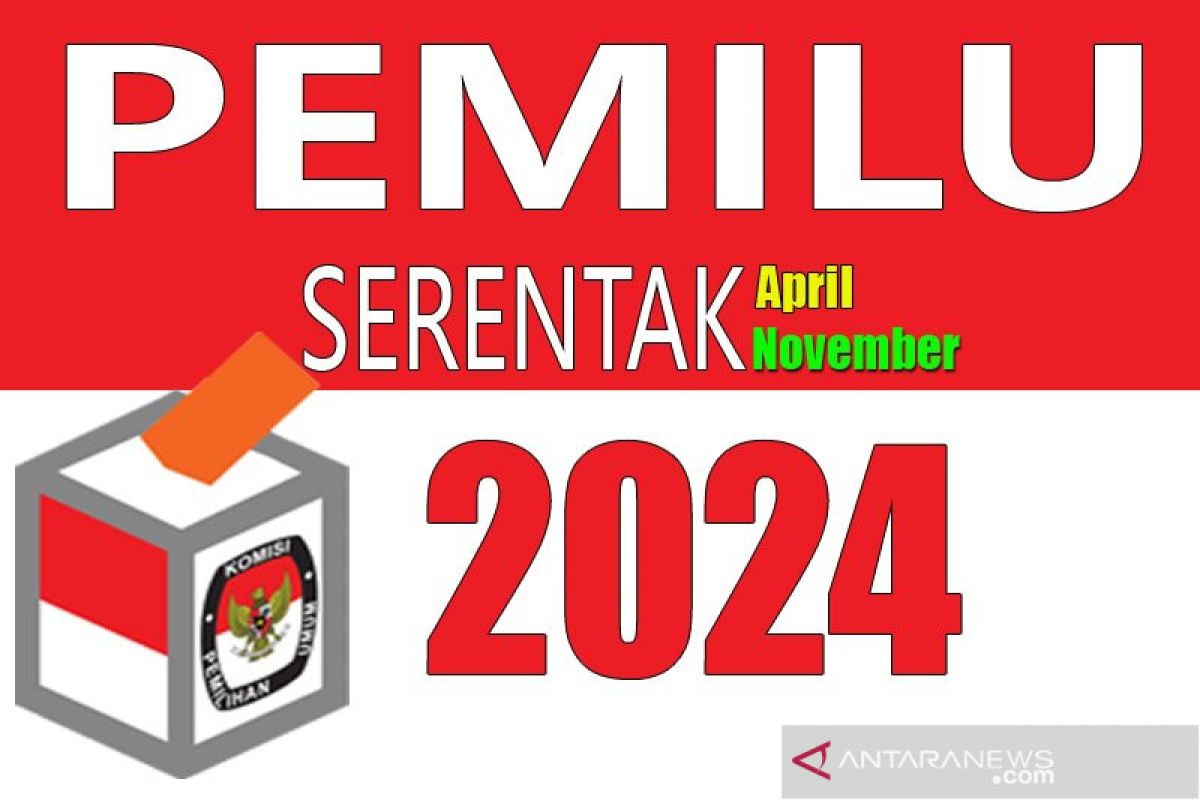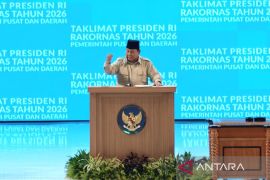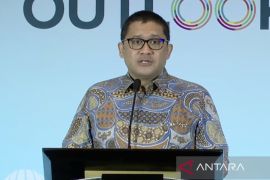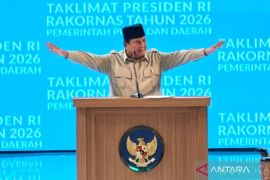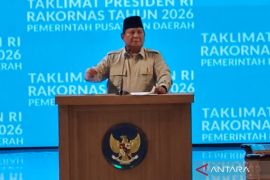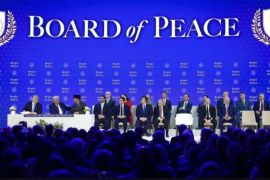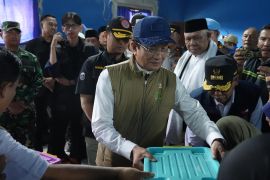The announcement was made by the ruling party's leader, Megawati Soekarnoputri, on April 21 or a day before majority of Indonesian Muslims celebrated the Idul Fitri which marked the end of holy month of Ramadhan.
For Indonesian women that reportedly contribute 102,474,462 voters to some 204,656,053 potential voters for next year's general elections, the date the PDIP chose to announce Pranowo's candidacy is a special day.
It is regarded special because, on that day, the Indonesian women annually celebrate the Kartini Day to commemorate the legacy of the country's female emancipation icon, Raden Adjeng Kartini.
On the day Megawati made the announcement that apparently shifts the political landscape ahead of the 2024 presidential race, there had been millions of Indonesian Muslims who had celebrated the Idul Fitri.
They are the followers of the astronomic calculation or "hisab" of Muhammadiyah, Indonesia's second largest Islamic organization after the Nahdlatul Ulama (NU) that determined the fall of Idul Fitri on April 21.
Unlike other political parties, in declaring its presidential candidate, the PDIP did not need to build a coalition with other political parties because it has met the 20 percent of presidential threshold.
The PDIP has indeed made a big surprise to many Indonesians who might have earlier thought that Megawati would prefer Puan Maharani, her daughter and granddaughter of Soekarno, to Ganjar Pranowo to become the party's presidential candidate.
Related news: PDI-P nominates Ganjar Pranowo for 2024 presidential election
Realistic decision
Megawati has, however, made a realistic decision by considering the results of various public opinion polls that had consistently placed Ganjar Pranowo in a leading position.
In several surveys on potential presidential candidates, Ganjar did not merely obtain more significant votes than those of Puan Maharani but also other figures, including Anies Baswedan and Prabowo Subianto.
Not only that. as the PDIP's cadre, Ganjar has also demonstrated his loyalty to the party's political stance on the rejection of Israeli soccer team's participation in the 2023 U-20 World Cup that Indonesia would host.
Like Bali Governor Wayan Koster who had earlier banned the Israeli soccer team, Ganjar had also announced his resistance against the team's participation due to Israel's colonial rule over Palestine.
The resistance of these two PDIP's cadres against the Israeli participation in the U-20 World Cup has apparently contributed to FIFA's decision to remove Indonesia from hosting the event.
For Megawati, the resistance against the Israeli participation in the U-20 World Cup has shown a consistency of supporting the Palestinian people's unfinished struggle for independence since the era of President Soekarno.
In 1962, her father, President Soekarno, had uttered a statement, which was then used as a guidance in the Indonesian foreign policy on the Palestinian issues.
President Soekarno stated: "As long as the freedom of Palestine has yet to be returned to the Palestinians, then it will forever be for Indonesia to stand in defiance against the occupation by Israel."
Related news: Ganjar Pranowo is a leader close to the people: Jokowi
Continuing presidential legacy
Apart from the pros and cons of rejecting the Israeli soccer team that has led to the removal of Indonesia's host country status, Ganjar Pranowo has shown his loyalty to Megawati and the party apart from the impact on his future political career he likely receives from those opposing his ban.
In this regard, Ganjar has successfully passed a loyalty test. Moreover, the PDIP's decision to select him as its presidential candidate is evidently related to the party's endeavors to keep gripping the power.
The PDIP seems to be willing to repeat its successes in bringing its cadre, Joko Widodo (Jokowi), to power in the 2014 and 2019 presidential elections to ensure the continuity of Jokowi's presidential legacy.
Jokowi alone has no longer been able to compete in the 2024 presidential elections because he has ruled the country for two presidential terms. Thus, constitutionally, he will end his second term on October 20, 2024.
Ganjar has obviously been perceived and believed by Megawati and the PDIP to be the most reliable cadre to continue Jokowi's leadership. Thus, by holding the power, he can continue what Jokowi has done and is doing.
Among the crucial national development programs the Jokowi and Ma'ruf Amin administration has been carrying out are the mega project of new capital city construction in East Kalimantan, and Trans-Sumatra toll project.
In August this year, the government has also planned to commence the operation of the Jakarta-Bandung high speed train, a mega project that "several economists and experts have warned of the possibility of Indonesia falling into China's 'debt trap'" (Jakarta Post, 2023).
In a speech he delivered on the day he was officially declared as the PDIP's presidential candidate, Ganjar Pranowo said he pledged to continue President Jokowi's development programs.
Therefore, he appealed to the PDIP's cadres all over the country to support him for winning the 2024 presidential race. "Please, support and advice me. One for all. All for one," he said.
Following the declaration of Ganjar Pranowo as the PDIP's official presidential candidate, the Indonesian people have so far had two figures to compete in next year's presidential race.
The other one is Anies Baswedan, former Jakarta governor who was declared by the National Democratic Party (NasDem) as its presidential candidate on October 3, 2022.
To meet the presidential threshold requirement, NasDem then built a coalition with Democratic Party (Demokrat) and Prosperous Justice Party (PKS). As a result, Anies' candidacy has met the requirement.
Meanwhile, Prabowo Subianto, who is currently defense minister, has also been declared as the Great Indonesia Movement Party's (Gerindra's) presidential candidate.
Gerindra, however, has yet to meet the 20 percent of presidential threshold requirement due to its limited number of seats in parliament. Therefore, the party is demanded to collaborate with other parties.
Related news: Committed to continuing President Widodo's legacy: Pranowo
Real challenge: 2045 Vision
As of Sunday (April 23), both Anies and Ganjar, who obtained their Sarjana (undergraduate) degrees at the Yogyakarta-based Gadjah Mada University (UGM), have yet to announce their vice presidential candidates.
Apart from the figures who will later this year be registered as the pairs of presidential and vice presidential candidates at the General Elections Commission (KPU), they will absolutely face great challenges.
They are challenged to be able to address many crucial problems that potentially prevent the country from achieving its ambitious goal of 2045 Vision. In celebrating the first 100th anniversary of its independence, Indonesia has hopefully become a well-developed and prosperous country.
To this end, among the problems the next pair of new Indonesian leaders need to be able to handle are stunting and lack of good quality of human capital, poverty and corruption eradication, Papua issues, middle-income trap, food and energy security, South China Sea dispute, and geopolitical rivalries.
To cope with those problems and challenges, they must work wholeheartedly, sincerely, smartly, and effectively. Last but not least, they are also demanded to be able to maintain the nation's unity in diversity.
*) Rahmad Nasution is an ANTARA journalist
*) The views and opinions expressed on this page are those of the author and do not necessarily reflect the official policy or position of ANTARA News Agency
Related news: Political differences in elections will not divide people: VP Amin
Copyright © ANTARA 2023
